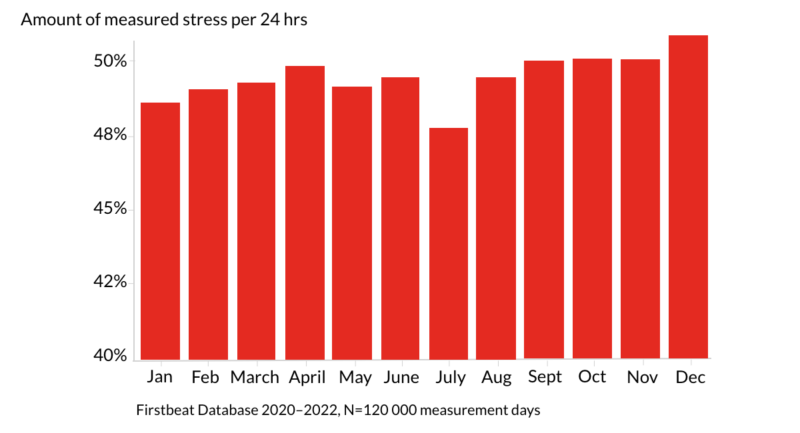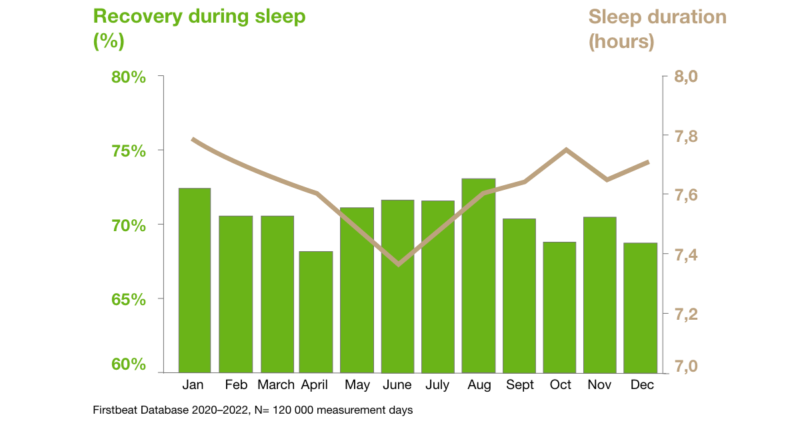
Firstbeat’s extensive wellness database (mostly from Finland but including a significant percent of measurements from other countries as well) reveals that December is the most stressful month of the year. Stress levels increase steadily as we move from July through the fall, and in December, the amount of stress is at its highest, with an average of 51% of measured stress per 24 hours (Fig. 1). In addition to stress, a typical day consists of recovery, light activity, and exercise.
Explanations for why December is more stressful than other months are likely to include things like increased year-end pressures at work, a heavier overall load, increased darkness and short days in the high north, holiday chores and hurries, and increased consumption of alcohol / late nights due to various events and parties. It’s easy to fill the holiday season with too many expectations and wishes, and a season of enjoyment, joy, and togetherness can turn into a season of running around and trying to do too much.

Figure 1. Stress levels are highest in December and lowest in July (a vacation month in Scandinavia). The result is based on Firstbeat Life heart rate variability measurements that are used to analyze stress and recovery.
In December, Stress Levels Increase And The Restorative Effect Of Sleep Decreases
Firstbeat defines stress as a physiological state during which the body’s activation level is elevated, including both positive and negative stress. Recovery is defined as a lowered level of activation, during which the body is able to restore its resources and recover.
It is completely normal that the day includes stress; it’s the body’s natural way of boosting its activation level in order to function and perform. Stress becomes harmful if there is too much of it relative to the amount of recovery. Our other finding about December can help explain why we find it so stressful: while the amount of stress increases, the restorative effect of sleep decreases at the same time, even if we sleep longer at the end of the year when compared to the lightest months of the year (Fig. 2).

Fig. 2. The duration of sleep gets longer towards the end of the year, but at the same time, the share of recovery during the sleep period gets lower.
Focus On Recovery: Ease Off And Lighten The Load Instead Of Trying To Do It All
During stressful periods, we should pay special attention to recovery because it does not occur automatically. Lengthening one’s sleep period is not always enough to ensure sufficient recovery and restoration, but especially if you have a tendency to sleep a bit too little, it can be a smart move. If our sleep period is too short, in addition to the sleep quality being less than optimal, it’s easy not to get enough recovery overall.
If you have pushed hard all fall, with long days at work and during leisure time, it’s now a good time to ease off a bit, instead of just keep charging ahead. It is not necessary to ‘get it all done’ by the end of the year, neither at work nor at home. If you celebrate Christmas, instead of focusing excessively on perfect presents and tables full of home-made food, why not focus on spending relaxing quality time with people close to you, without too much pressure or expectation of perfection. By taking care of your own recovery and resources, you will improve the odds that this December and holiday season will be relaxing instead of the most stressful time of the year.
Firstbeat Life is the leading technology to support the health and well-being of your customers. It offers you a unique capability to succeed in the growing market for proactive health and well-being services. Utilize world-class physiological measurements to enhance your service offerings. Learn more about Firstbeat Life.
If you liked this article, you should subscribe to our newsletter.
You might also be interested in

How to Keep Your Stress Levels in Check When Hybrid Working
The COVID-19 pandemic forced millions of people into remote work and we have learned that it’s possible to do a lot of jobs and work tasks remotely. Hybrid working, which…

Towards Better Sleep: What Do Hormones, Daylight and Being Active Have to Do with It?
In March we celebrate healthy sleep because it is international sleep month and sleep awareness month – and today is World Sleep Day. A good time to spend a few…

Firstbeat Life: How Do You Get Employees Engaged in Corporate Wellness?
When it comes to corporate wellness, one of the most common problems is getting employees engaged. So, what to do? Our specialist gives concrete tips, how to get employees commit to small changes.


